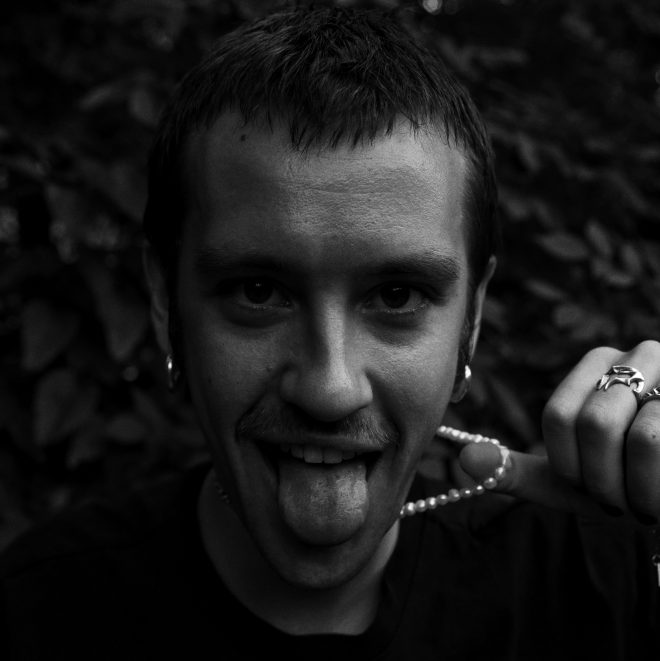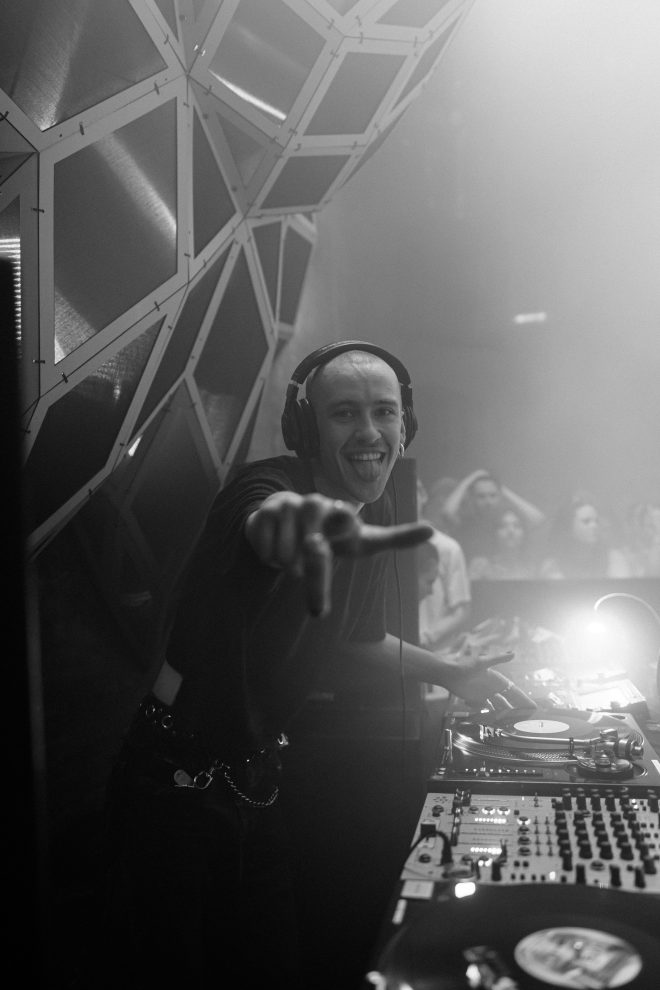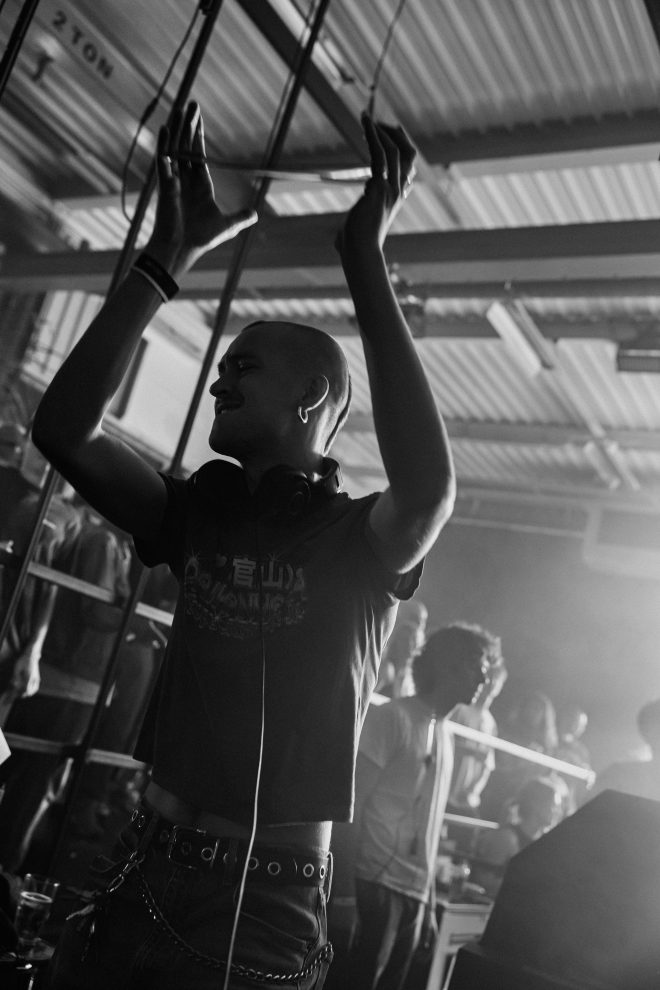Dj Henk: Built From The Underground

Something about DJ Henk feels steady and deeply anchored. No façade, no branding talk, no digital noise, just a pure sense of purpose. He doesn’t separate the person from the artist because, in his world, there is no difference. Born and raised in Berlin, shaped by its raw energy and relentless rhythm, DJ Henk embodies a generation rediscovering what authenticity means in an industry built on speed.
His story isn’t about chasing trends or algorithms. It’s about preservation, protecting the essence of a culture that gave him purpose. Through vinyl, community, and sheer devotion, DJ Henk has become one of the new faces of Berlin’s hard dance underground. What sets him apart isn’t volume or hype. It’s conviction.
THE ARTIST
“For me, there’s no difference between the person and the artist. DJ Henk is who I am. It’s one and the same.”
The Berlin underground didn’t just shape his sound. It shaped his philosophy.
“It taught me that this culture only survives through community work, by giving something back and by protecting what makes it special. Being a DJ isn’t just about creating music for a fleeting weekend experience. It’s about keeping the culture alive, supporting it, shaping it, and preserving it from disappearing.”
That sense of duty defines everything he does.
“It’s a lifestyle. To me, it’s not just about going out on the weekend. The real work happens during the week, preparing, connecting with others in the community, whether they’re ravers, technicians, promoters, or even people building turntables. It’s about going to record stores, digging for music, producing tracks, not for casual listening on Spotify or SoundCloud, but for DJs, for clubs, for dance floors, for massive sound systems, for the weekends.”
Berlin’s energy runs through him like a current.
“Electronic music culture was born in Berlin, and me too. That’s why it’s so important to me to preserve this culture. It’s shaped who I am as a person as much as it shapes me as an artist.”

FROM BASEMENT RAVES TO EUROPEAN FLOORS
“There were many defining people and moments along the way,” he says. “One of the first turning points for me happened on the dance floor at Herrensauna. That’s when I realized, this is what I want to do. I want to DJ.”
From that moment, his life became a study in vinyl.
“A close friend told me to start with vinyl to learn the basics first. He said I could always move on later, but vinyl would teach me to really understand music. I listened, and I loved it so much that I never stopped.”
The timing was fateful.
“This was around the start of the pandemic. During that time, I met Get No, and we spent countless hours in his studio, sometimes mixing records for twelve hours straight. Later, we started playing every Tuesday at an open-decks night here in Berlin for one or two years. It was like a little secret, one of those insider Tuesday spots everyone in the underground knew about.”
What began as an experiment became a movement.
“After about six months, we were filling the place every week, and that’s where I really started building my community. Eventually, some things with the organizers didn’t go so smoothly anymore. But one of them told us, ‘You should just go and start your own party.’ And that’s exactly what we did.”
That party became 16pitch, an only-vinyl night born from frustration and love.
“It was the next natural step, taking the community I had built and creating something that was truly ours.”
Soon after, Amsterdam came calling.
“That was also when Nanno discovered us and booked us for our first bigger parties. Today, Nanno and I even run my agency TURBO together, which feels really special.”
And then came the moment that changed everything.
“I shared a lineup with Sabu, she was on the main floor, I was on the smaller one. After my set, she came up to me and said I’d apparently played half her floor empty because people came over to check out my set. She was impressed and asked if she could take over my bookings. That made me incredibly happy. Not just because I’d wished for that for a long time, but because it reminded me that there’s still a strong sense of community and mutual support between artists.”
From there, Henk’s life became a blur of records and late-night travel.
“Before that, I had spent years playing alone at home, just me, my records, and the music. Every single day I’d mix purely out of love, imagining what it would feel like to one day share it with others. So when that moment finally came, when I realized I was actually allowed to play my music in front of people, on big sound systems, it hit me deeply. It felt like a privilege, not a given.”
Now, the bookings haven’t stopped.
“Suddenly I was playing almost every week, sometimes more than once, and every set reminded me how special it is to share something so personal with a crowd.”
He pauses, smiling.
“Everything really came step by step. A very organic growth.”
Amsterdam became a second home.
“One of the biggest moments was when Die Rakete booked me for the first time in Amsterdam, and I became a resident there. Those were my first truly professional gigs, the kind where I got to experience another side of the DJ life. I still have some of my most beautiful memories from Die Rakete. From there, things in the Netherlands really started to unfold.”
Even now, he’s still moving forward.
“Sadly, that party doesn’t exist anymore, but I’ve started playing for a new Dutch series called Paardenrave, and rumor has it, I might become a resident there too.”

VINYL IN A DIGITAL AGE
Few DJs defend vinyl as fiercely as Henk does.
“For me, it’s all about the handling, actually having something in your hands, connecting with the record itself. When you play vinyl, you really get to know your tracks. You memorize every break, every moment, you know exactly when each element comes in. That relationship with the music is something I deeply value.”
He laughs softly.
“Because records are expensive and take time to find, you think twice before buying one. You ask yourself if this track truly deserves a place in your bag, if it really represents what you want to say. That process creates a deeper sense of appreciation and respect, for the music, for the craft, and for the culture around it.”
The challenges, however, are real.
“It can be really tough to keep playing vinyl these days. The technical conditions are often bad for so many reasons. I’ve had situations where I had to cancel gigs because of technical issues, and times when promoters tried to talk me out of it. Honestly, if you look at it purely from a practical standpoint, playing vinyl is full of disadvantages. But still, I wouldn’t change it for anything.”
For Henk, records aren’t nostalgia. They’re discipline.
“When I play vinyl, I’m not looking at a screen. I’m just listening. That’s what it’s about for me, to hear, not to see.”
He doesn’t reject digital either.
“There are some things in digital DJing that I think are really cool, like looping or reverse functions. If I could have those on vinyl, I would use them. But what I love most is the focus it demands. I have to stay aware every second, I have to be inside the mix because the beats must match perfectly. That full connection with the music is what I love most about vinyl.”
And some tracks have stayed with him for years.
“I don’t really have one record that never leaves my bag, but there are a few that are with me at about 80 percent of my gigs. Two of them are special. One was part of my Sachsentrance mix, which reached a lot of people and introduced them to me. The other is one of my very first Happy Hardcore records, a turning point for where my sound was heading. I’ve been playing it for years, and it just never stops being powerful.”
THE CULTURE
Henk’s perspective bridges two worlds, Berlin and Amsterdam.
“I believe Berlin and Amsterdam are two of the strongest cities when it comes to electronic music culture and partying. Of course, each city has its own character. Berlin tends to be a bit more serious, with that classic techno flair, while Amsterdam feels more experimental and colorful. People smile more on the dance floor, raise their hands, and really celebrate together.”
But for him, the comparison misses the point.
“Both cities are so unique that it’s impossible to say which is better. What really unites them is the effort to preserve this culture. There are so many people working hard to keep it alive, from organizers to DJs to everyone involved. That dedication is what I really admire.”
He’s nostalgic about what he calls “the new underground.”
“I never really experienced the original underground days since I was born in 2000. But I grew up inside what I’d call the new trance and hard dance revolution, back when there were only a few parties of that kind in Berlin. You really had to search and wait for the next one.”
What he misses most is intention.
“People came purely for the music. There were no big names or headliners, just small, mostly unknown DJs. Everyone kind of knew each other; it felt like a family. The scene today is still connected, but it’s grown so much that it doesn’t always have that same communal feeling.”
And what gives him hope?
“I hope things move back toward enjoying the moment, without phones and cameras. I also hope the scene evolves back toward appreciating the full musical journey of a night. Promoters used to build lineups as stories. I’d love to see people coming again to experience that concept as a whole, not just waiting for a hype DJ.”
He channels that vision through his agency, TURBO.
“In my own booking agency, I want to represent diverse artists who truly live and love music. People who wake up thinking about music and go to bed the same way. Artists who don’t just play it, but are it.”
The mission is simple: protect the spirit that raised him.
“It’s about working with people who share the same values: passion, honesty, and respect for the culture. I want to build something that protects that underground spirit, where it’s not about algorithms or hype but about creating real experiences and giving something back to the community.”
And community, for Henk, always comes first.
“We organize small events during the week and try to keep the entry prices super low so everyone can be part of it. Last time, our presale tickets were five euros. For me, it’s not about business. It’s about community, building a family of artists and ravers who care deeply, who live this culture with love and authenticity.”
THE NEW EP
Now, DJ Henk is ready to translate all that philosophy into sound.
“My first EP, which will be released in the next few months, reflects how I see the current state of things, both in the scene and on the dance floor. The concept ties back to what I’ve been talking about throughout this interview: music that’s made for the dance floor.”
His focus remains pure.
“These tracks are not about overproduction or chasing trends. They’re built for movement, for energy, for DJs to play. Each one is designed to make sense in a set, to connect with people physically and emotionally on the floor.”
At its heart, the EP is a statement of purpose.
“For me, it’s about keeping that spirit alive, raw, direct, and honest, music that lives where it belongs: on a sound system, surrounded by people who feel it.”


